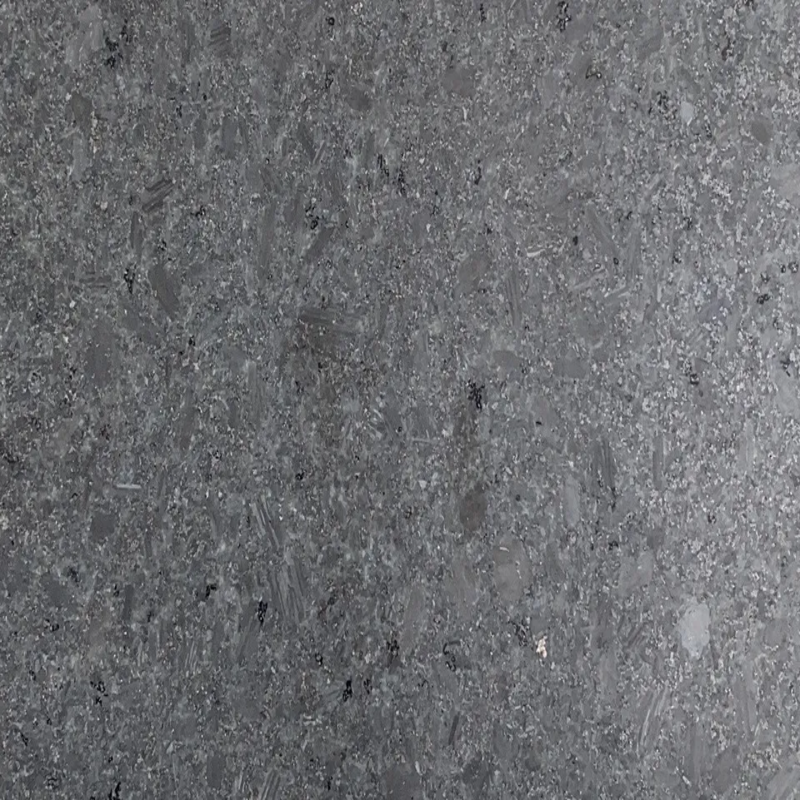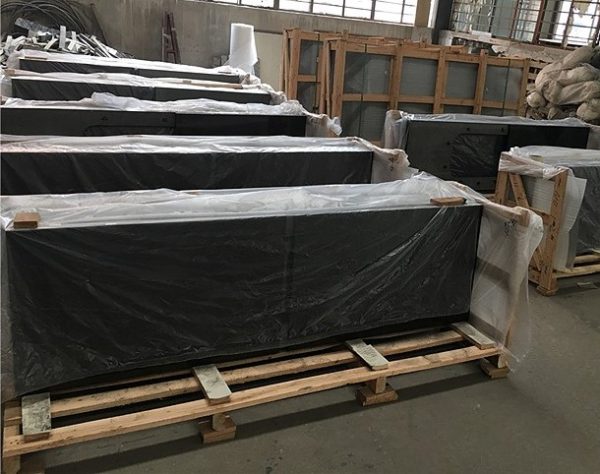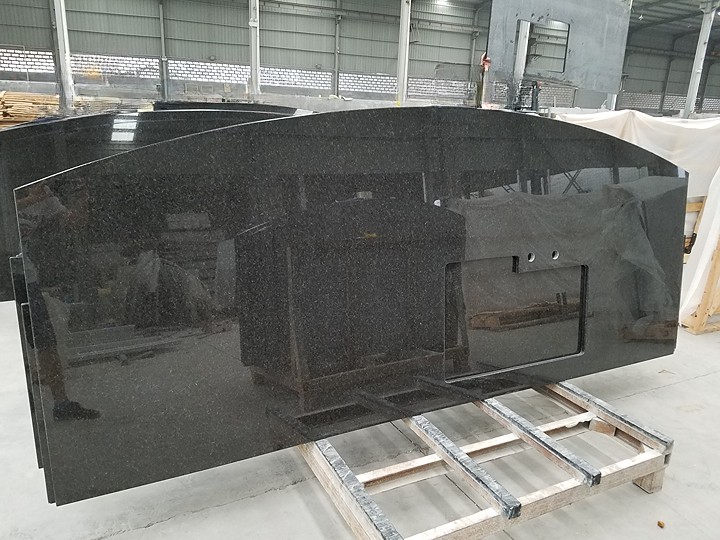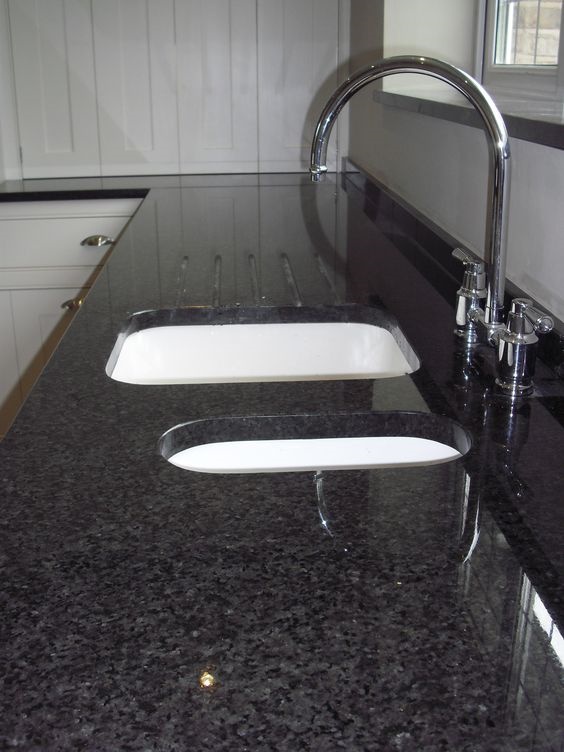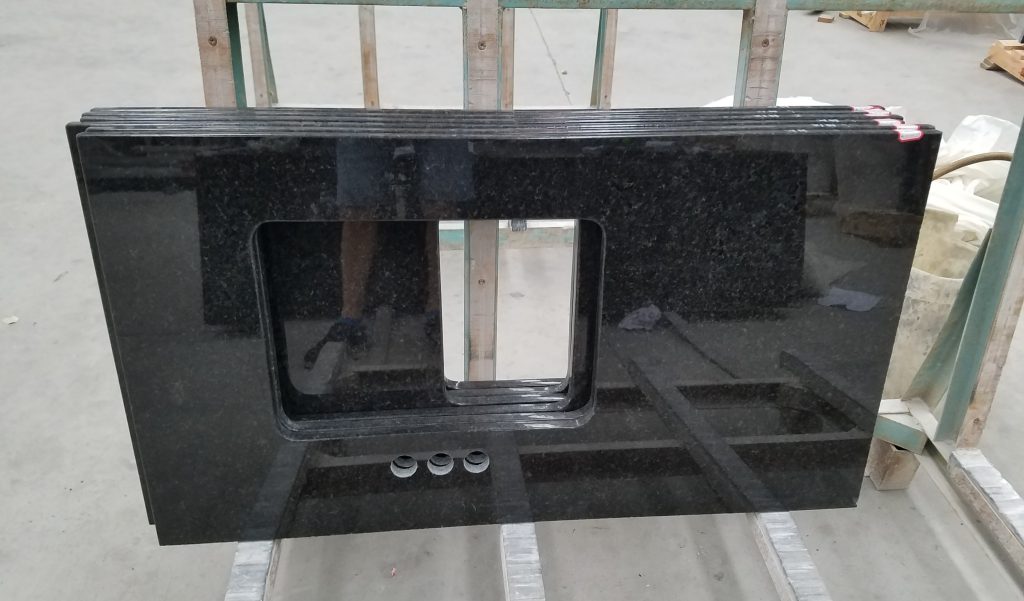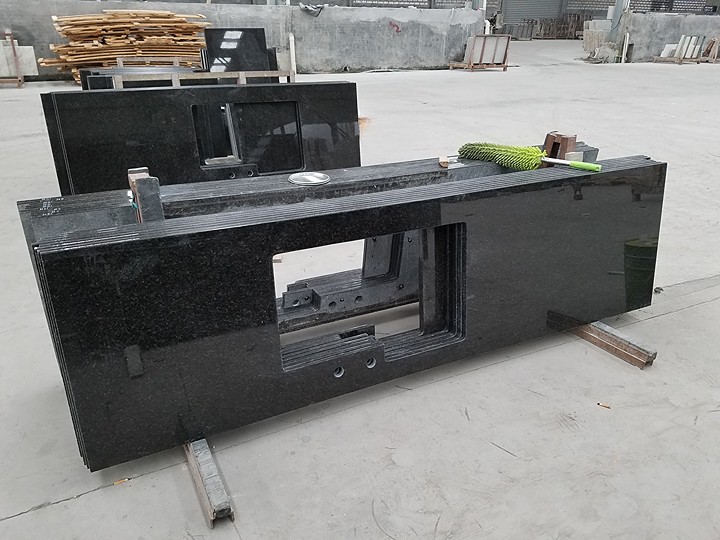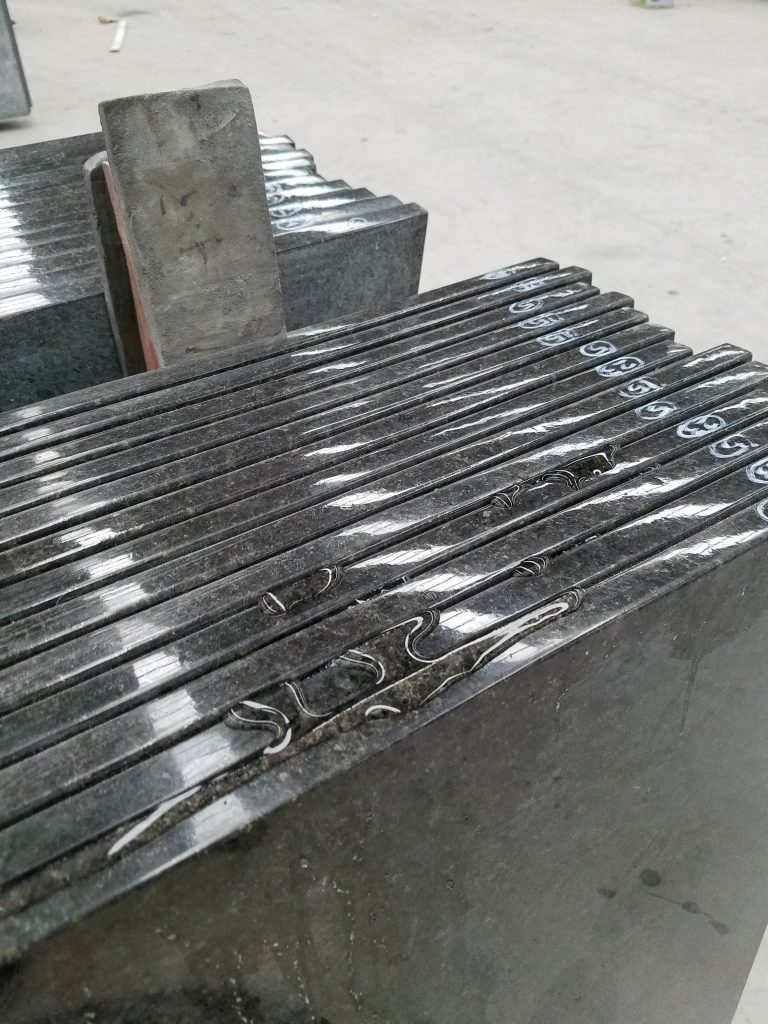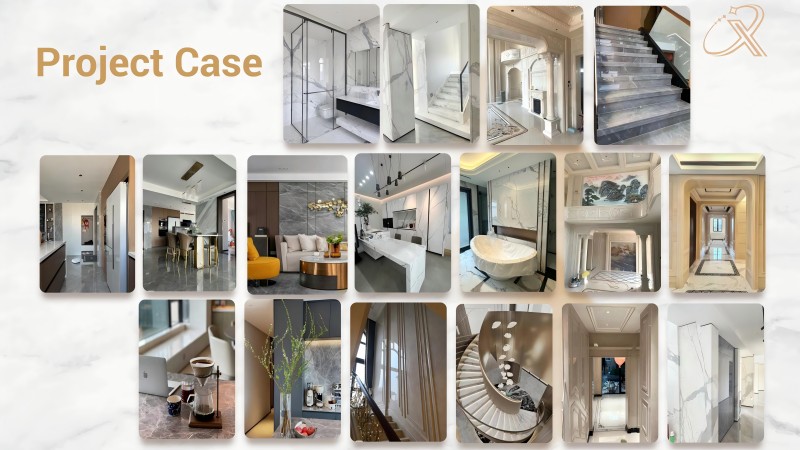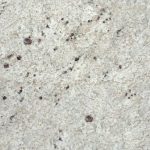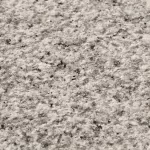Black Pearl Granite
Black Pearl Granite is a highly popular and striking natural stone known for its deep, rich black color with unique, multi-colored speckles and veins. It is considered a premium granite variety, and it is often used in various interior and exterior design applications due to its durability and aesthetic appeal. Here’s a closer look at what makes Black Pearl Granite special:
1. Color and Appearance
- Base Color: Black Pearl Granite typically has a dark black or charcoal base, which is its most defining feature.
- Speckled Appearance: The stone is known for its distinctive speckles or flakes in various shades, including gray, silver, gold, and sometimes even green. These irregular patterns create a captivating, almost shimmering effect when light hits the surface, making it visually dynamic.
- Veining: While some slabs may have minimal veining, others might feature more pronounced veins or lines running through the surface, often in white or silver tones, adding depth and contrast to the stone.
2. Composition
- Black Pearl Granite is made up of a combination of minerals, primarily feldspar, quartz, and mica. The mica content in particular gives the granite its shimmering effect and adds a subtle sparkle when viewed from different angles.
- This composition also contributes to the stone’s natural durability and strength.
3. Origin and Availability
- Source: Black Pearl Granite is primarily quarried in India, where it is extracted from several quarries across the country. It is widely available and sought after globally.
- Availability: While it is a popular granite variety, its availability can fluctuate based on demand and quarry production. As with many natural stones, unique slabs may be limited, and color patterns can vary from one piece to another.
4. Durability
- As a granite, Black Pearl is highly durable, making it suitable for use in high-traffic areas. It is resistant to scratching, chipping, and heat, which makes it ideal for countertops, backsplashes, and flooring.
- Hardness: Granite is one of the hardest natural stones, which gives Black Pearl its resilience and long-lasting qualities.
- Stain Resistance: Like most granite, Black Pearl is relatively resistant to stains, though it still requires sealing to protect it from liquids and oils that could seep into its porous surface.
5. Applications
Black Pearl Granite is a versatile material that can be used in a variety of interior and exterior design applications:
- Kitchen Countertops: Its elegant appearance and durability make it a top choice for kitchen countertops. The striking contrast and depth of the stone complement both modern and traditional kitchen designs.
- Bathroom Vanities: The stone’s luxurious and bold look works well for bathroom countertops and vanity tops, adding sophistication to bathrooms.
- Flooring: It is durable enough to be used as flooring in both residential and commercial spaces, particularly in high-traffic areas.
- Backsplashes: Its dynamic texture and color variations can make Black Pearl a great choice for kitchen or bathroom backsplashes, adding a unique focal point to the space.
- Exterior Cladding and Paving: Its toughness makes it suitable for outdoor applications like cladding or paving, especially in regions with harsh weather conditions.
- Fireplaces: It is often used for fireplace surrounds due to its striking appearance and ability to withstand high temperatures.
6. Maintenance
- Sealing: While Black Pearl Granite is stain-resistant, it is still recommended to seal the stone periodically (once every 1-2 years) to maintain its resistance to stains, especially in high-use areas like kitchens.
- Cleaning: The stone can be cleaned easily with mild soap and water. Avoid harsh chemicals or acidic cleaners, as they can damage the stone’s surface.
- Polishing: Over time, Black Pearl Granite can lose its shine, especially in high-traffic areas. A granite polish can be used to restore its glossy finish.
7. Price Range
- Black Pearl Granite is typically considered a mid-range to premium granite, depending on factors such as the slab’s quality, size, and origin.
- The price generally ranges between $40 to $100 per square foot, though it can be more expensive for larger slabs or for slabs with rare patterns or intricate veining.
8. Aesthetic Appeal
- Modern Elegance: The sleek black surface with its multi-colored speckles can create a sophisticated, modern look in any room. It’s perfect for creating a contemporary feel while also adding visual interest.
- Versatility: Its neutral yet dramatic appearance means it pairs well with a variety of materials, from light-colored cabinets and floors to more rustic elements like wood or stone.
- Timeless Beauty: Granite is a timeless material, and Black Pearl, with its deep, luxurious look, is no exception. It has enduring appeal and won’t go out of style, making it a great investment for long-term design projects.
9. Considerations
- Variation in Appearance: Like all natural stones, Black Pearl Granite can have natural variations in its pattern and color from slab to slab. It’s important to choose slabs that complement each other if multiple pieces are being used in a space.
- Weight: Being a dense, heavy material, granite requires strong support structures, especially for countertops and large installations.
How does compare Black Pearl Granite to other natural stones in terms of durability?
When comparing Black Pearl Granite to other popular natural stones (like marble, quartzite, soapstone, and limestone) in terms of durability, granite generally stands out as one of the hardest and most resilient materials. Here’s a breakdown of how Black Pearl Granite stacks up against other natural stones in various aspects of durability:
1. Hardness and Scratch Resistance
- Black Pearl Granite: Granite is one of the hardest natural stones, ranking 6-7 on the Mohs scale of hardness (where diamond is 10). Black Pearl Granite, with its granite composition, is highly resistant to scratching and chipping, making it ideal for high-traffic areas like kitchens.
- Comparison to Other Stones:
- Marble: Marble is much softer than granite, ranking around 3-5 on the Mohs scale. It is more prone to scratching, staining, and etching (especially from acidic substances like lemon or vinegar).
- Quartzite: Quartzite is also a very hard stone, typically ranking around 7 on the Mohs scale, similar to granite. Like granite, quartzite is highly resistant to scratches and is considered one of the hardest natural stones, even more resistant than marble.
- Soapstone: Soapstone is much softer, ranking 2-3 on the Mohs scale. While it is not prone to scratching, it can be easily scratched compared to granite and quartzite. However, it has the advantage of being non-porous and can develop a patina over time.
- Limestone: Limestone is relatively soft, around 3-4 on the Mohs scale, and is prone to scratching and erosion, especially in high-use areas.
2. Heat Resistance
- Black Pearl Granite: Granite, including Black Pearl Granite, has excellent heat resistance. It can withstand high temperatures without cracking, making it a great choice for kitchen countertops near stovetops and ovens. However, using trivets or hot pads is still recommended to protect the surface from thermal shock.
- Comparison to Other Stones:
- Marble: Marble can handle moderate heat but is more sensitive to extreme heat compared to granite. Prolonged exposure to high heat can cause damage or discoloration, especially in the form of burns or etching.
- Quartzite: Quartzite is extremely heat-resistant, even more so than granite, making it a good alternative for areas prone to high temperatures, such as kitchen countertops and backsplashes.
- Soapstone: Soapstone has a high heat tolerance and is often chosen for its ability to retain and distribute heat, making it ideal for areas like wood stoves and fireplaces. However, it can darken with heat over time.
- Limestone: Limestone is not as heat-resistant as granite. It can be damaged by prolonged exposure to heat, which may cause cracking or discoloration.
3. Stain Resistance
- Black Pearl Granite: Granite is relatively resistant to staining but is still porous and can absorb liquids if not properly sealed. It is resistant to most acids and oils (though not immune), especially when sealed regularly.
- Comparison to Other Stones:
- Marble: Marble is more porous than granite and prone to staining and etching, especially from acidic substances like wine, vinegar, or citrus. It requires more maintenance and frequent sealing to maintain its appearance.
- Quartzite: Quartzite, like granite, is non-porous once sealed, making it highly resistant to stains. It is one of the most stain-resistant natural stones, particularly when sealed properly.
- Soapstone: Soapstone is non-porous and stain-resistant. It is highly resistant to most acids and oils and does not require sealing. Over time, it may develop a patina, but this doesn’t affect its performance or stain resistance.
- Limestone: Limestone is more porous than granite and is highly susceptible to staining, especially from oil, wine, or acidic substances. It requires regular sealing and is less practical for kitchen use due to its susceptibility to stains.
4. Resistance to Impact and Chipping
- Black Pearl Granite: Granite is extremely durable and resistant to impact, making it one of the best stones for areas subject to heavy use. It is less likely to chip or crack under normal wear and tear.
- Comparison to Other Stones:
- Marble: Marble is more prone to chipping and cracking under impact due to its softer, more brittle nature.
- Quartzite: Quartzite is very tough and more resistant to impact and chipping compared to marble and limestone. It’s almost as durable as granite.
- Soapstone: Soapstone, though soft, is very dense and can resist chipping under normal circumstances. However, it is easier to scratch and dent than granite or quartzite.
- Limestone: Limestone is more susceptible to cracking and chipping compared to granite and quartzite due to its softness and porosity.
5. Maintenance
- Black Pearl Granite: Granite, including Black Pearl Granite, is relatively low maintenance. It requires periodic sealing (about once a year) to protect against staining and ensure it remains resistant to moisture. Regular cleaning with mild soap and water is sufficient to maintain its appearance.
- Comparison to Other Stones:
- Marble: Marble requires more frequent maintenance and careful cleaning due to its susceptibility to staining, scratching, and etching. It needs to be sealed regularly.
- Quartzite: Quartzite requires minimal maintenance, similar to granite. Once sealed, it is highly resistant to stains and scratches.
- Soapstone: Soapstone requires less maintenance compared to marble and limestone, but it may need periodic re-oiling to maintain its appearance and enhance the patina.
- Limestone: Limestone requires regular sealing and maintenance to prevent staining and etching. It can be more labor-intensive to care for compared to granite or quartzite.
6. Aesthetic Durability (Longevity of Appearance)
- Black Pearl Granite: Granite is known for its timeless beauty and will maintain its appearance for many years with proper care. It resists fading from UV light, making it suitable for both indoor and outdoor applications.
- Comparison to Other Stones:
- Marble: Marble can develop a patina over time, especially in high-use areas. While this may be desirable in some contexts, it can also result in a more worn or aged appearance.
- Quartzite: Quartzite also maintains its beauty over time, often outlasting granite. It doesn’t discolor from sunlight and is highly resistant to fading.
- Soapstone: Soapstone darkens over time, creating a natural patina. While some people appreciate this change, it may not appeal to those who prefer a consistent appearance.
- Limestone: Limestone can wear down and lose its original luster over time, especially in areas with high traffic. It is more prone to erosion and fading than granite or quartzite.
Summary Comparison:
| Durability Factor | Black Pearl Granite | Marble | Quartzite | Soapstone | Limestone |
|---|---|---|---|---|---|
| Hardness | Very Hard (6-7 on Mohs) | Soft (3-5 on Mohs) | Very Hard (7 on Mohs) | Soft (2-3 on Mohs) | Soft (3-4 on Mohs) |
| Scratch Resistance | Excellent | Poor | Excellent | Good | Poor |
| Heat Resistance | Excellent | Moderate | Excellent | Excellent | Poor |
| Stain Resistance | Good (with sealing) | Poor | Excellent (with sealing) | Excellent | Poor |
| Impact Resistance | Excellent | Poor | Excellent | Good | Poor |
| Maintenance | Low (sealing required) | High (frequent sealing) | Low (sealing required) | Low (oiling may be needed) | High (frequent sealing) |
| Aesthetic Longevity | High (maintains beauty) | Moderate (patina, etching) | High (maintains beauty) | Moderate (patina) | Low (wear and erosion) |
What’s the Application of Black Pearl Granite?
Black Pearl Granite a range of high-end interior projects since its beauty and unusual tint are widely appreciated.
1.Black Pearl GraniteCountertop :Black Pearl Granite is often used to create stunning kitchen countertops and bathroom vanity tops. Its striking black color and intricate veining add elegance and sophistication to these spaces.
2.Wall Cladding: As a wall covering,Black Pearl Granite can create a focal point in any room. It is used in both residential and commercial settings to enhance the visual appeal of walls.
3.Flooring: While it is less commonly used for flooring compared to harder stones like granite ,Black Pearl Granite still be used in areas with light foot traffic, such as bathrooms, entryways, and other interior spaces.
4.Feature Walls: The dramatic veining and color variations of Black Pearl Granite make it ideal for creating accent walls or feature walls in living rooms, dining rooms, or even hotel lobbies.
5.Decorative Items: Smaller pieces of Black Pearl Granite, such as tabletops, fireplace surrounds, and decorative objects, can be used to add a touch of luxury and sophistication to interior design.
6.Bathroom Applications: Besides vanity tops,Black Pearl Granite can be used for shower walls, bathtub surrounds, and other bathroom surfaces to create a spa-like atmosphere.
7.Furniture: Custom furniture items like side tables, dining tables, and coffee tables. These works of art that are also useful elevate any room. Each furniture piece is distinctive and draws attention because of the distinctive patterns and colours of this Black Pearl Granite
8.Art Installations: Designers and artists frequently work with Black Pearl Granite to produce one-of-a-kind art installations. In galleries, public areas, and private collections, artistic works are made stand out by the depth and personality that the natural beauty of the stone provides.
What are the unique features of Black Pearl Granite that make it appealing for interior design?
Black Pearl Granite is a luxurious and versatile natural stone that is widely used in interior design for both residential and commercial spaces. Its unique features make it especially appealing for those seeking a combination of beauty, durability, and sophistication. Here are some of the standout features that make Black Pearl Granite a popular choice:
1. Striking Aesthetic Appeal
- Deep, Rich Color: The dark, black base color of Black Pearl Granite provides a sleek, modern, and elegant look. It works well in a variety of design styles, from contemporary to traditional.
- Speckled Pattern: One of its most distinctive features is the shimmering, multi-colored speckles throughout the surface. These speckles often include shades of silver, gold, gray, and even hints of green, creating a visually dynamic surface that reflects light in different ways, adding depth and texture to any room.
- Variety of Slab Patterns: Because Black Pearl Granite is a natural stone, each slab is unique, offering a variety of veining and speckling patterns. This ensures that no two installations are exactly alike, contributing to a bespoke, one-of-a-kind design.
2. Durability and Strength
- Scratch and Chip Resistance: Granite is known for its hardness and durability. Black Pearl Granite is highly resistant to scratches, chips, and cracks, making it ideal for high-traffic areas such as kitchens and bathrooms. It can withstand daily use without showing wear.
- Heat Resistance: Granite, including Black Pearl, is heat-resistant, which makes it a great choice for kitchen countertops. It can handle hot pots and pans without suffering damage, although using trivets is always a good idea to preserve the stone’s finish.
- Stain Resistance: While granite is naturally resistant to stains, Black Pearl Granite still benefits from periodic sealing to maintain its resistance to liquids, oils, and other staining agents. This makes it a low-maintenance option for busy spaces.
3. Versatility in Design
- Modern and Classic Appeal: Black Pearl Granite’s rich color and striking speckled pattern make it adaptable to various interior styles. It works well with contemporary designs, providing a sleek, high-end feel, but it can also complement more traditional or rustic interiors when paired with wood, metal, or lighter materials.
- Contrasting or Complementing Elements: Its dark, bold appearance contrasts beautifully with lighter cabinetry, walls, and flooring. It can also complement stainless steel appliances, white cabinetry, or light-colored flooring to create a balanced, high-contrast look in the kitchen or bathroom.
4. Timeless Elegance
- Black Pearl Granite is often considered a timeless material. Its deep, luxurious colors and unique speckled patterns remain relevant in design trends, making it an investment that will last for years. Unlike trendy materials that may go out of style, granite has enduring appeal and can add value to a property.
5. Low Maintenance
- While granite requires sealing (about once every 1-2 years), Black Pearl Granite is relatively low maintenance compared to other natural stones like marble. It doesn’t stain easily, and its hard surface resists etching from acidic substances like citrus or vinegar, unlike marble, which requires more frequent care.
6. Customizable Applications
- Countertops: Black Pearl Granite is a popular choice for kitchen and bathroom countertops due to its durability, heat resistance, and aesthetic appeal. It offers a luxurious, polished look that enhances the visual appeal of the space.
- Backsplashes: Its dynamic, eye-catching speckled pattern makes it an excellent material for backsplashes. The surface reflects light and adds texture, creating a focal point in kitchens and bathrooms.
- Floors: The stone’s resilience to scratches and its striking visual effect make it an ideal option for flooring, especially in high-traffic areas. It can add a sleek, sophisticated look to entryways, hallways, or living spaces.
- Fireplaces and Feature Walls: Black Pearl Granite can be used for fireplaces or accent walls to create dramatic focal points. The natural elegance and depth of the stone enhance the atmosphere of any room.
- Vanities: The material works beautifully in bathrooms, providing a luxurious vanity top that pairs well with various design styles, from modern to classical.
7. Light Reflection and Visual Interest
- Black Pearl Granite’s speckles reflect light in a subtle yet striking way. The shimmer adds visual interest and depth to the stone, making it a perfect choice for spaces where you want the surface to catch the light and become a feature of the room.
- The reflective qualities of the stone allow it to blend seamlessly with natural and artificial lighting, which can change the appearance of the stone at different times of the day, adding a dynamic aspect to the space.
8. Value Addition
- High-End Material: Due to its durability, aesthetic appeal, and luxurious appearance, Black Pearl Granite is often considered a high-end material. Installing it can add value to a home, making it an excellent investment for those planning to sell or rent their property in the future.
- Long Lifespan: The stone’s durability ensures that it will remain beautiful and functional for decades, making it a wise investment for long-term use.
9. Eco-Friendly Option
- Natural Stone: As a natural stone, Black Pearl Granite is a more sustainable choice compared to synthetic materials. Its durability means it will last longer, reducing the need for replacements. Additionally, granite is recyclable and can be reused for various applications when no longer used in its original form.
Factors affecting Black Pearl Granite price?
The price of Black Pearl Granite can vary depending on several factors that influence its cost. Understanding these factors can help you better estimate the price and make more informed decisions when purchasing this natural stone for your project. Here are the main factors that affect the price of Black Pearl Granite:
1. Quality of the Stone
- Pattern and Color: The consistency of the speckling and the intensity of the black color can affect the price. Slabs with more uniform patterns or particularly vibrant or rare colorations may command a higher price.
- Grade: Black Pearl Granite can come in different grades based on its quality. Higher-grade slabs, which have fewer imperfections, cracks, or blemishes, will typically cost more.
- Finish: The type of finish applied to the stone can also affect its price. Polished finishes are more expensive due to the labor-intensive process involved, while honed or leathered finishes might be priced slightly lower.
2. Slab Size and Thickness
- Slab Size: Larger slabs of Black Pearl Granite will cost more than smaller slabs because they require more raw material to quarry and transport. The price per square foot typically decreases with larger slab sizes due to economies of scale, but larger projects generally have a higher overall cost.
- Thickness: The thickness of the granite slab (e.g., 2 cm vs. 3 cm) can also impact the price. Thicker slabs tend to be more expensive due to the extra material used and the increased weight, which may also add to transportation costs.
3. Source and Quarry Location
- Geography and Origin: Black Pearl Granite is primarily quarried in India, but it may also be sourced from other regions. The distance the granite must be shipped can affect the cost, as international shipping or long-distance transportation adds to the overall price.
- Rarity and Availability: If the Black Pearl Granite is sourced from a rare quarry or is in limited supply, it can command a premium price. Some quarries may also have different yields of this stone, which could affect its availability and pricing.
4. Market Demand
- Popularity: If Black Pearl Granite is in high demand, its price may increase. Trends in interior design and architectural preferences can influence demand. For example, if dark granite countertops are trending in the market, the price may rise.
- Demand Fluctuations: Seasonal fluctuations in demand (e.g., during home renovation booms) or economic conditions can affect the price, as suppliers adjust pricing based on market trends.
5. Fabrication Costs
- Cutting and Shaping: The complexity of cutting and shaping the granite into custom sizes, edges, or intricate designs can increase the cost. Standard straight edges are less expensive to fabricate, while custom edges like ogee, bullnose, or waterfall edges can add to the overall price.
- Polishing and Finishing: The process of polishing or applying a specific finish to the stone (e.g., honed, leathered, or brushed) can influence the cost. Polishing, which is a time-consuming process, tends to increase the price of Black Pearl Granite.
- Customization: If you have special design needs, such as intricate patterns or custom cuts, this can increase fabrication costs. The more labor-intensive the work, the higher the price.
6. Shipping and Transportation Costs
- Distance: If the granite is being sourced internationally, the distance it must travel from the quarry to the fabricator or retailer will affect its price. The farther the stone has to be shipped, the higher the cost due to transportation fees, including freight, handling, and customs duties.
- Volume: If you are purchasing a large quantity of granite (for a whole kitchen or a commercial project), suppliers may offer discounts on bulk orders. However, smaller quantities may not benefit from such discounts and may be priced higher on a per-unit basis.
- Delivery Method: The type of delivery method used can also influence the cost. Special handling or expedited shipping may add additional charges to the final price.
7. Supplier and Vendor Markup
- Retail vs. Wholesale: The price of Black Pearl Granite can differ significantly depending on whether you’re purchasing from a wholesaler or a retailer. Retailers often mark up the price to cover their overhead costs and provide services like installation and delivery.
- Exclusive Distributors: Some distributors might offer premium or exclusive quality slabs, which can increase the cost. High-end retailers often price the material higher due to their branding or services provided alongside the stone.
8. Sealing and Maintenance Products
- Pre-sealed Slabs: Some suppliers may offer pre-sealed granite slabs, which can add a slight premium to the price. Sealing is important for ensuring that the stone remains stain-resistant and easier to maintain over time.
- Maintenance Costs: The need for regular sealing and care (depending on the finish) can contribute to the overall cost of ownership over time. While Black Pearl Granite is relatively low-maintenance, understanding sealing and upkeep can impact long-term cost considerations.
9. Installation Costs
- Labor: The cost of installation can vary based on the complexity of the project. Installation involves cutting, shaping, and sometimes joining multiple slabs, which requires skilled labor. The more complicated the installation (e.g., for large or custom countertops), the higher the labor cost.
- Edge Treatments: More intricate edge profiles (like ogee or bevel) require additional time and expertise, leading to higher labor costs for installation.
- Transportation of Slabs: For large or heavy slabs, additional costs may arise for handling, transportation, and lifting, especially if the installation site has difficult access.
10. Quality Control and Certification
- Certification and Quality Control: Stones that come with certifications, like ISO standards or environmental certifications, can be more expensive. This ensures the quality, safety, and sourcing transparency of the granite, which might appeal to eco-conscious buyers or those seeking a guaranteed quality product.
- Imperfections or “Off-Grade” Slabs: If a granite slab has visible imperfections or isn’t up to grade, it may be sold at a lower price. High-quality slabs with minimal natural defects will generally be priced higher.
Why Opt For Xiamen Funshine Stone?
1.Our design consultation service at Funshine Stone gives our customers peace of mind, high-quality stone, and professional guidance. Our expertise lies in natural stone design tiles, and we offer comprehensive “top to bottom” consulting to realize your idea.
2.With a combined 30 years of project expertise, we have worked on a vast array of projects and established enduring relationships with numerous people.
3.With a huge assortment of natural and engineered stones, including marble, granite, bluestone, basalt, travertine, terrazzo, quartz, and more, Funshine Stone is pleased to provide one of the largest selections available. It is clear that our use of the best stone available is superior.







